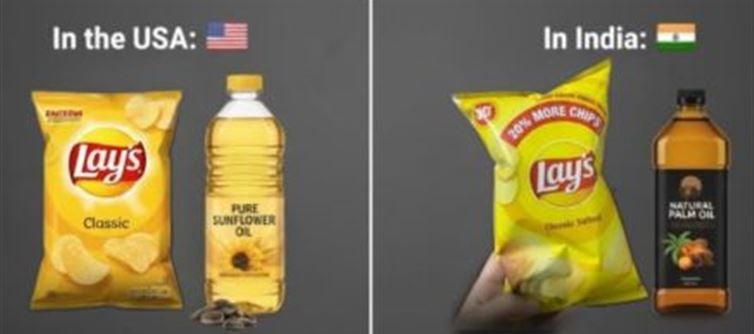
The real story isn’t oil — it’s how global brands quietly shape national health outcomes by exploiting cultural blindspots.”
Most people see this as a simple “palm oil vs sunflower oil” debate.
But the hidden angle is how multinational brands redesign formulas based on what each country tolerates, not what is healthiest. The real question:
👉 Are developing markets becoming global testing grounds for cheaper, riskier ingredients because companies know regulations and public scrutiny are weaker?
“Why Your Packet of Lays Says More About Your Country’s health Priorities Than Your doctor Does!”
What if the chips you eat aren’t just snacks—but a mirror reflecting how corporations view your country’s health value? A quiet disparity in ingredients across borders reveals a shocking global divide.
The Snack that Exposes a Global Double Standard: Are indians Eating a Cheaper, Riskier Version of Lays?
Walk into a supermarket in the USA and pick up a packet of Lays. You’ll find it cooked in sunflower oil—praised for being low in saturated fats and linked with better heart health. Cross the globe to india, and you’ll find the same brand, same packaging, same logo… but an entirely different oil: palm oil, infamous for spiking LDL cholesterol and being linked to long-term heart risks. One global brand. Two formulas. Two health trajectories.
This is not a coincidence. This is not logistics. This is a corporate decision—one that labels your geography as your health fate.
Why would a multinational giant consciously choose healthier oil in the West and a riskier, cheaper option in the East? The simple, uncomfortable truth:
👉 Because they can.
In the USA, consumers demand transparency, lawsuits are faster than recalls, and health awareness is mainstream. In india, however, large corporations understand something uncomfortable: people rarely read labels, regulators allow “acceptable flexibility,” and the average shopper worries more about price than ingredient safety. That makes india the perfect market for cost-cutting—hidden behind glossy packaging and celebrity endorsements.
Palm oil isn’t just unhealthy—it’s incredibly cheap. For a company selling millions of packets a day, that difference isn’t pennies; it’s billions saved annually.
And who pays the health cost? Not the corporation. The consumer does.
But the deeper, more disturbing angle:
This is not just about Lays. Many global brands silently downgrade ingredients when selling in developing countries—everything from chocolates to ice creams to cereals. It’s a global health hierarchy, silently placing some nations above others.
When companies optimize for profit, they don’t just change recipes—they change outcomes. They shape cholesterol levels, childhood health patterns, long-term disease risk, and even national healthcare burdens.
So the next time you open a packet of chips, remember:
You’re not just tasting a snack.
You’re tasting the value a global company assigns to your market.
And the question india needs to ask is simple:
If our money is the same colour globally, why isn’t our health priority?




 click and follow Indiaherald WhatsApp channel
click and follow Indiaherald WhatsApp channel